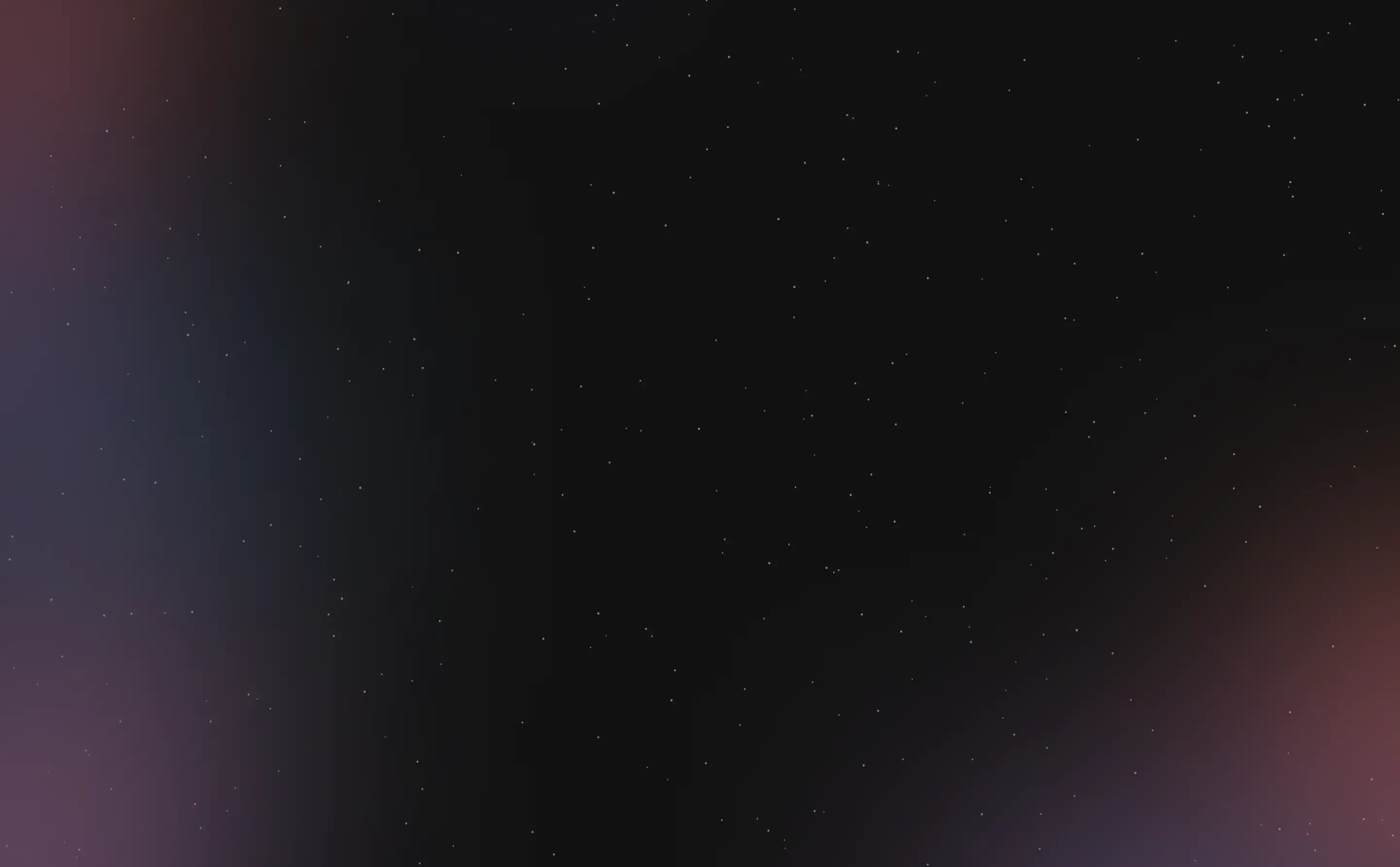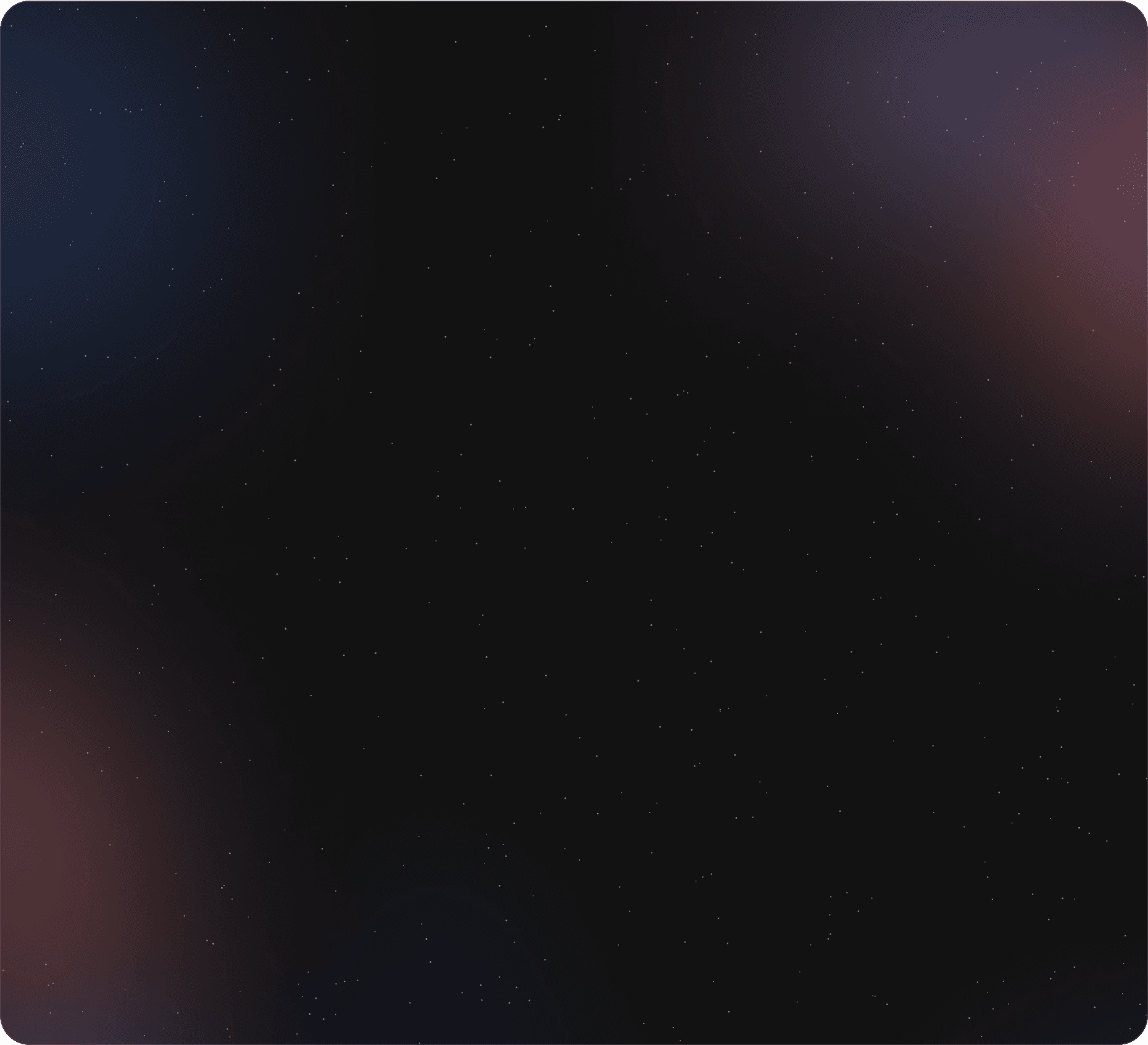Shadow Fall Review
Youtini's full review of Shadow Fall: An Alphabet Squadron Novel by Alexander Freed!
Jun 21, 2020
Note: This article may contain affiliate links, meaning we may earn a commission if you purchase through them at no extra cost to you. See our disclaimers for more information.
Middle chapters in storytelling trilogies often shoulder a remarkable burden. The audience has already been introduced to the main characters and conflict, but we know for a fact that we must not receive the answers to all of our questions within the second book or film.
This creates a difficult set of expectations. We must be satisfied with the piece yet intrigued for the finale. We must be reminded of the past yet propelled forward into the future. And throughout all of fiction, the penultimate sequel has found varied amounts of success.
So for this review, I like to think of some of my favorite middle chapters. The Empire Strikes Back. The Last Jedi.
And now...Shadow Fall.
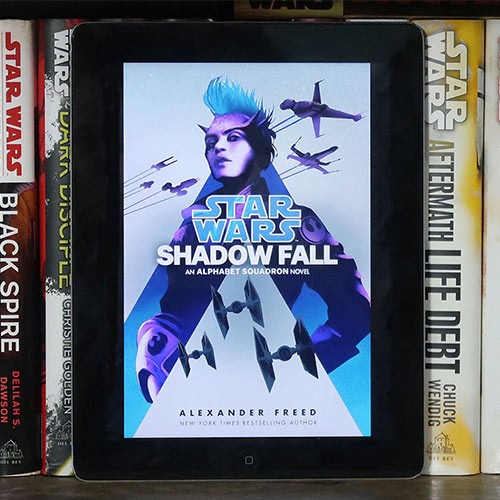
Alexander Freed’s second adventure detailing the exploits of the roguish Alphabet Squadron shines just as brightly as its predecessor and delves into even darker depths that will leave you desperately counting the days until the trilogy’s conclusion next year.
Plot
Fans of Freed’s previous work in Star Wars know that his tactical sensibilities are pretty unparalleled in the publishing world. The first Alphabet Squadron novel as well as Battlefront: Twilight Company are packed with extensive military discussions and positively epic action scenes that take you through every single decision that changes the course of the battle.
Shadow Fall further refines Freed’s abilities in this sector by creating some of his best action scenes to date and interspersing them with some of the most personal storylines he’s ever written.
This novel begins with our squadron enjoying a time of relative peace. While the notorious Shadow Wing is still at large, the New Republic’s harrowing victory at Pandem Nai has allowed Yrica, Nath, Will, Chass, and Kairos to work on missions that involve a little more recon and a little less planetary destruction. However, this momentary respite is short-lived as General Hera Syndulla and Cairn Adan develop a plan to lure the vicious fighter unit out of the darkness.
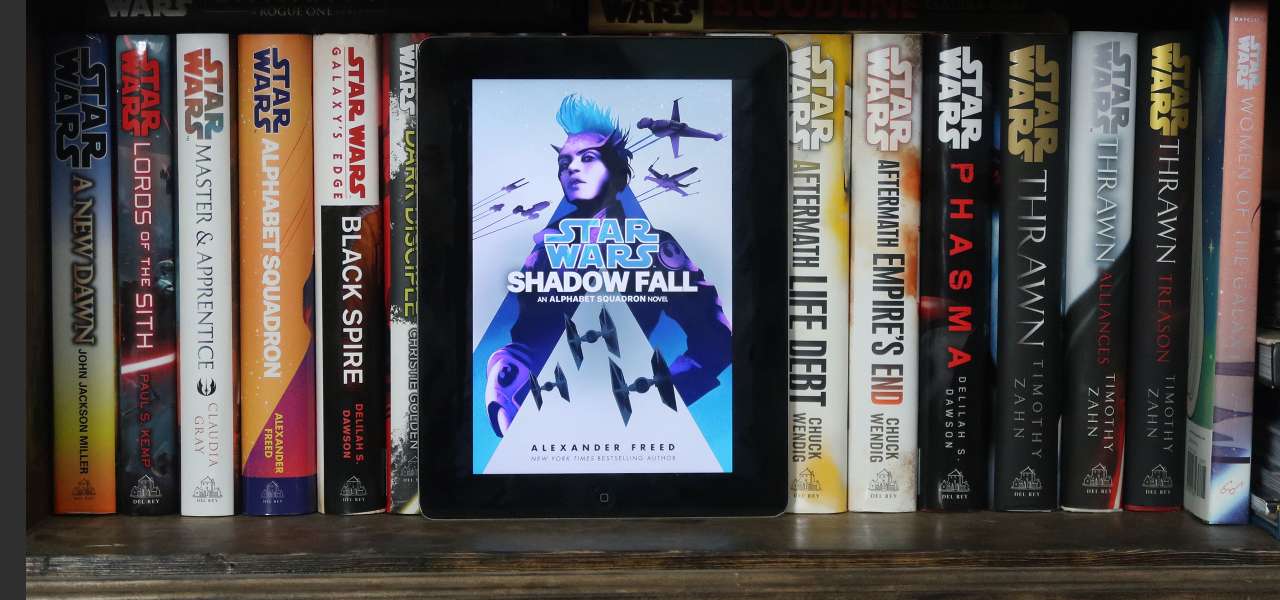
A trap is laid, plans go awry, secrets are revealed, and the destruction of the entire unit hangs in the balance before you know it.
As opposed to the multiple locations of the first novel in the series, Shadow Fall focuses its conflict solely in the Cerberon system. This choice does occasionally make the story feel more intimate than Alphabet Squadron, but the multiple worlds within Cerberon are expanded so deliciously that it makes up for the relative lack of geographic variety. However, this expansion can act as a double-edged sword for readers who chose to consume their Star Wars media at a particularly aggressive pace. Shadow Fall is densely packed with plotlines from the point of view of almost every single main character, so you may have to rely on a bit of rereading to catch every facet of the larger narrative.
Shadow Fall’s story also takes the time to further examine the psychological makeup of our heroes as the various segments of the plot unfold. A battle is never just a battle, and a flight is never just a flight. Every military move and biting betrayal that Freed inflicts on his characters inherently reveals something additional about their personality; something unique to this particular saga and something that had me sitting with the story long after I closed the final page.
Characters
Perhaps the most anticipated part of Shadow Fall’s release was the return of its astonishing cast of characters. With Alphabet Squadron, Alexander Freed composed a crew of varied personality types that spoke to all different types of readers. Now, fans not only had their favorite type of ship but also their favorite pilot that was behind the wheel…yoke...you get it.
All of our major players from the first book return vibrantly in this second installment, but rather than spend an extensive amount of time with our favorite squadron as a whole, Freed makes the decision to split them into smaller teams.
At the risk of spoiling major plot points, some team members spend the book surrounded by new allies, others potential foes, and others still are practically absent through the majority of the book’s conflict. This type of division isn’t abnormal in Star Wars storytelling (think of Luke’s Dagobah escapades or Rey’s journey to Ahch-to in their respective middle chapters), but the choice to split off the main cast throughout the book is a bold move nonetheless.
Various members of our team were drawn to different character relationships that were strengthened throughout these respective journeys, but Yrica Quell’s evolution unanimously stood out as a highlight of the book. After ending the first book with the thread of her dark past being leaked to those she trusts most, she spends Shadow Fall trying to hide the truth from discovery but also attempting to answer the much scarier question...has she really changed at all?
“But Soran Keize had never been a true believer in the Empire anyway. He believed in people. His people, mostly.”
Quell’s storyline grips you ravenously every time that she returns to the page, but another remarkable standout in Shadow Fall is our multifaceted antagonist Soran Keize. Unknowingly featured in the first Alphabet Squadron, Keize returns to glory here as the reemerged commander of Shadow Wing. We witness his attempts to return the squadron to its full power as he also wrestles with the new factions of his identity.
How much did his time as Devon alter the course of his life? Does he truly believe in the Empire he has sworn to serve? And at the end of the day...will any of that stop him from completing his mission?
Keize’s narrative throughout Shadow Fall solidifies him as one of the most complex Imperials we’ve ever seen in the Expanded Universe, and the dedication to crafting such a multifaceted antagonist for our squad of broken protagonists seeking meaning of their own is yet another masterful stroke from Freed’s pen.
With the conclusion of the trilogy likely arriving next fall, we can assume that geographical divisions in the squad will be easily reduced, but the emotional canyons formed between them will require far more delicate repairs.
Originality
As noted earlier, Alexander Freed’s descriptions of tech, military strategy, and world expansion are relatively unparalleled in Star Wars literature. At no point throughout Shadow Fall do you doubt that he knows the exact specifications of every planet, ship, and weapon that is mentioned on the page, and that familiarity allows the entire story to feel extraordinarily authentic.
When we interviewed Freed on The Living Force Podcast, we asked him about his supreme skill with technical storytelling, and he seemed surprised at our description. Rather than thinking of himself as a technical military writer, he expressed his desire to simply write what the characters are passionate about.
If a soldier spends their entire life around guns, they’ll probably know a lot about them. If a pilot spends their full existence in the confines of a cockpit, their inner monologue will likely reflect that.
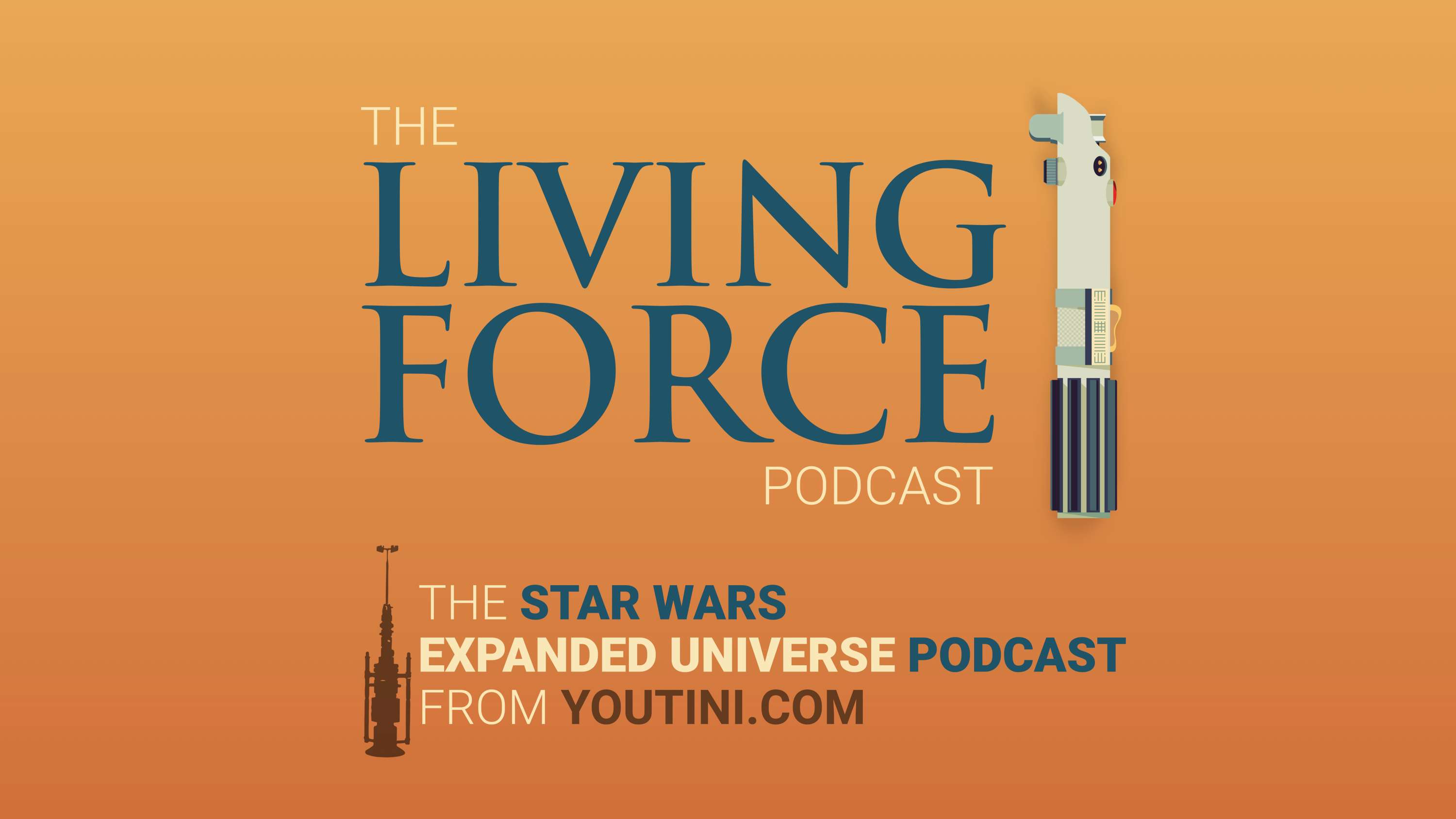
And you can see that dedication to detail throughout this book in a number of places from the expansive tactical knowledge of Freed’s very own Twilight Company who features heavily in Shadow Fall to the local population of Troithe that finds themselves allying with Soran Keize and the aces of Shadow Wing. The natural expertise exhibited by these characters opens a doorway through which Freed is able to seed the Star Wars universe with more lore in a way that serves the story, the reader, and the wider galaxy.
Additionally, Freed tackles one particular facet of Shadow Fall in a way rarely seen in a galaxy far, far away. While droids have been a key part of Star Wars since the first scene in the original film, the introduction of the IT-O, the torture-droid-turned-therapist, in Alphabet Squadron showcased the possibilities found within our favorite synthetic beings in an entirely new way. Shadow Fall builds upon that introduction in a breathtaking and frankly heartbreaking way that will find you questioning how a piece of tortured machinery can possibly bring you to tears.
Writing
One of the constant highlights of Alexander Freed’s writing is his magnificent battle sequences. Historically, he has excelled in crafting grand militaristic set pieces composed of various phases and moving parts, and Shadow Fall continues that tradition in impressive style.
Throughout Shadow Fall’s numerous air, ground, and space conflicts, Freed leads his audience through the various locations of each individual battlefield to really identify the scope of what’s happening. While this writing style undeniably presents the most information possible, there are points in the book where speedier readers can get lost within the details.
Like a fine whiskey, this writing is best consumed at a leisurely sip rather than an aggressive shot.
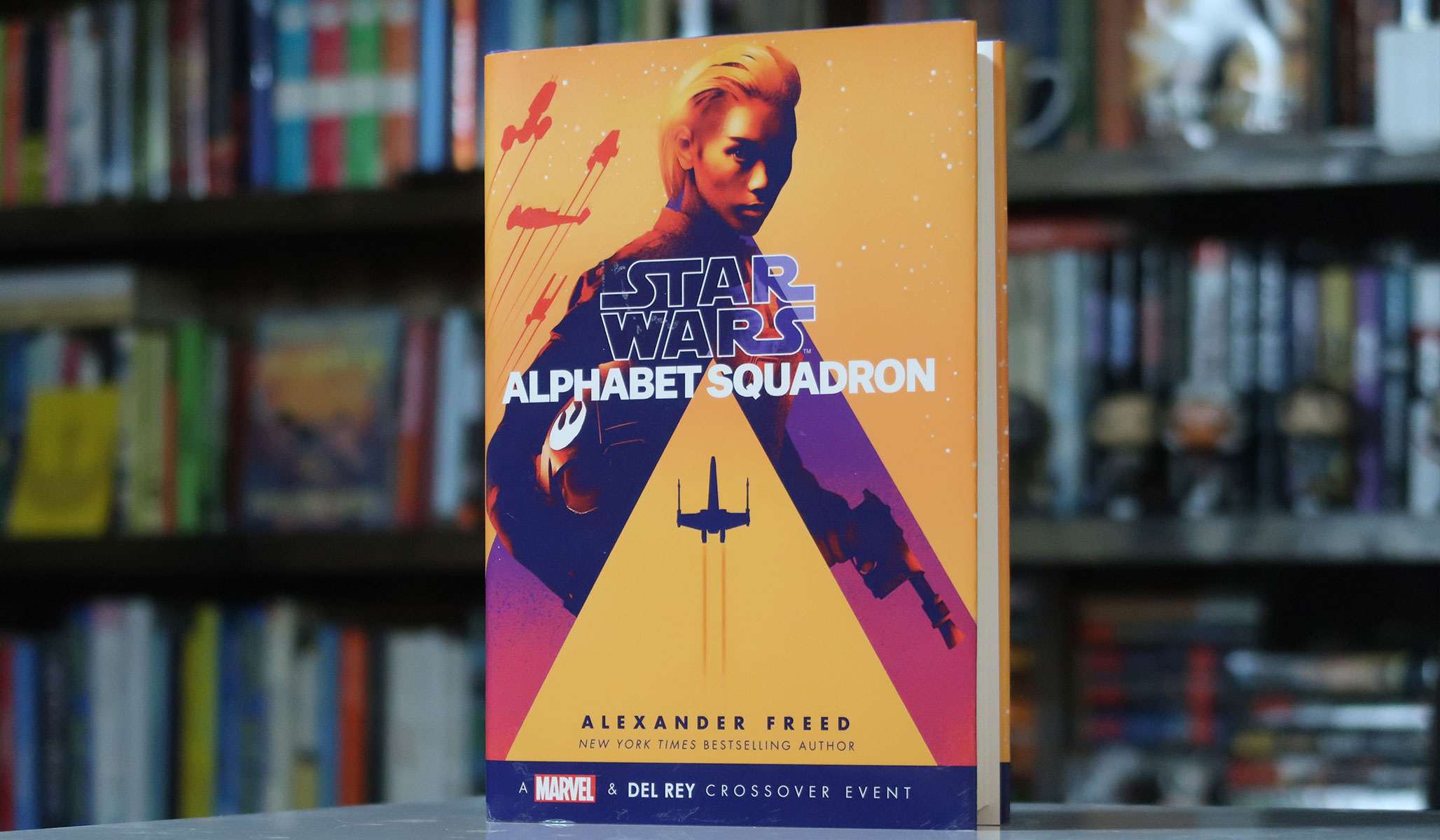
When the Alphabet Squadron series was first announced, fans of the classic Legends X-Wing series from Michael Stackpole and Aaron Allston simultaneously hoped and feared that Freed’s style of ship combat would take a heavy amount of influence from those tales of Wedge Antilles and Corran Horn. Freed, however, further distances himself from those other fantastic books in Shadow Fall by creating a more intimate atmosphere throughout every sprawling battle.
While we are most certainly aware of the larger chessboard, we rarely find ourselves on the bridge of a command ship or the control center of a planetary base. Instead, Freed constantly plunges us into the cockpits where we are able to experience every decision made by the aces we’ve come to know and love. Not only do we know which triggers they’re pulling and which maneuvers they’re attempting, we also know what’s going on in their hearts as the battles rage on.
Are they excited? Are they scared? Do they feel guilt for the lives they are taking or vengeance for the ones they’ve avenged?
The effortless combination of these psychological issues within the technical description of the combat puts Freed a world apart from other authors of the genre. While the pure density of the wordplay may have readers going back to the top of the page from time to time, the originality and complexity creates a product that is undeniably Freed in the best way.
Entertainment
One of the constant praises of the first Alphabet Squadron novel was its ability to balance the gravitas of ship combat with the intimacy of fireside chats and evolutionary character beats. Shadow Fall continues this tradition brilliantly, and the result is a book that is as entertaining a ride as any you’ll find in the Star Wars Canon.
Alexander Freed’s thrilling battle sequences constantly make you feel like you’re in the midst of epic conflict to the point where I felt my heart physically racing during particular sequences, but the adrenaline is perfectly balanced with quieter moments of reflection and growth. The heroes of Alphabet and Shadow Wing alike spend these books tackling questions that will define the rest of their lives, and though the identification and examination of those questions could be a dull break from the excitement of combat, their entertainment value is just as high.

It’s this skillful balance of highs and lows that propel you through Shadow Fall’s story with ease despite its inherent density. At the end of the day, every single character is someone that you are excited to spend time with, and with a book littered with such an expansive cast, that’s no easy feat.
Freed’s decision to split his chapters between so many different points of view could have been a nail in the coffin from the start of the first book. After all, who among us has groaned in other series when a character we particularly dislike interrupts the action of one of our favorites? Luckily, Shadow Fall’s various character plotlines are so varied that each break supplies the reader with a completely different type of experience.
Rarely can you rely on a single book to supply you with so many contrasting scenes and experiences, but that roller coaster of emotions ensures that the Alphabet Squadron trilogy will be remembered as one of the most entertaining Star Wars projects for years to come.
Audio
Star Wars audiobooks have long been lauded as the industry standard for music, effects, and overall immersion they provide for the listener. Shadow Fall somehow takes this banner and elevates it even higher.
Because of the amount of ship flight and combat littered throughout the story, the pure volume of sound effects and music is staggering to even consider. What’s even more miraculous? It all fits perfectly.
Listeners of Shadow Fall will swear that they are enmeshed within a fifteen hour film as their headphones transport them above the skies of Troithe and onto the pockmarked surface of the planet. The musical choices, while not solely the traditional John Williams score, evoke the visceral feel of Star Wars so intensely that certain passages are more apt for a hyperactive gym workout than a relaxing afternoon listen.
Fans of Saskia Maarleveld’s magnificent narration of the first Alphabet Squadron may be disappointed to know that the second book in the series has shifted those duties to Carol Monda, a renowned narrator of more than 400 audiobooks. While the shift in voice can be a bit jarring at the start, Monda handles the language with grace and impeccable style. Her voice work is varied and true to character despite her being a bit older than most of the protagonists, and her deep tone is perfect for the dark stakes of the battles she describes.
While consistency in narration throughout a book series can be a sticking point for some folks, fans of the original Alphabet Squadron should feel more than confident in throwing an Audible credit toward Monda and her work on Shadow Fall. If you’ve been wondering how you’re going to fill your time before the next cinematic Star Wars experience in 2022, all you have to do is close your eyes and let this audiobook take you away to our favorite galaxy.
Verdict
Alexander Freed is creating something truly special with the Alphabet Squadron series.
Although we at Youtini absolutely adore the standalone novels that we’ve received over the past few years of Star Wars Canon, there is something undeniably thrilling about the continuation of a series. Shadow Fall’s ability to remind us why we loved the first Alphabet Squadron while also enhancing the stakes of the story at large firmly places this novel in the upper tier of Star Wars literature.

For years, Star Wars books have toed the line between plot focused and character centric novels, but authors like Freed continually show us that the notion of sacrificing one for the other is quickly becoming archaic. Complex tactical plots can and should contain journeys of discovery, doubt, and evolution, and as readers, we are all the richer for their inclusion.
Next year will bring the undoubtedly epic conclusion of the Alphabet Squadron series, and once you finish the final page of Shadow Fall, I can guarantee you’ll be counting down the days until we’re able to jump into these cockpits one last time.
For more info about Shadow Fall, check out our exclusive interview with Alexander Freed on The Living Force, visit our Official Book Profile where you can find additional staff comments, user reviews, and affiliate links to order the book directly and help Youtini out in the process.
Eric Eilersen is a Senior Writer at Youtini and co-host of The Youtini Show. He loves collecting Star Wars Funkos, lightsabers, and LEGO as well as playing video games, reading Brandon Sanderson novels, watching the Dallas Cowboys, and spending time with his partner and pets. You can follow him at @EricEilersen.



